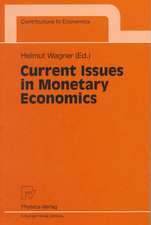Financial Structure and Stability: Contributions to Economics
Editat de Alexander Karmannen Limba Engleză Paperback – 26 oct 2000
Din seria Contributions to Economics
- 18%
 Preț: 1001.81 lei
Preț: 1001.81 lei -
 Preț: 90.83 lei
Preț: 90.83 lei - 15%
 Preț: 649.06 lei
Preț: 649.06 lei - 18%
 Preț: 1109.92 lei
Preț: 1109.92 lei - 24%
 Preț: 657.09 lei
Preț: 657.09 lei - 18%
 Preț: 976.54 lei
Preț: 976.54 lei - 17%
 Preț: 361.03 lei
Preț: 361.03 lei - 18%
 Preț: 1027.83 lei
Preț: 1027.83 lei -
 Preț: 283.93 lei
Preț: 283.93 lei - 15%
 Preț: 644.95 lei
Preț: 644.95 lei - 15%
 Preț: 638.24 lei
Preț: 638.24 lei -
 Preț: 394.29 lei
Preț: 394.29 lei - 15%
 Preț: 636.80 lei
Preț: 636.80 lei - 15%
 Preț: 637.78 lei
Preț: 637.78 lei - 18%
 Preț: 723.69 lei
Preț: 723.69 lei - 15%
 Preț: 635.47 lei
Preț: 635.47 lei - 15%
 Preț: 634.00 lei
Preț: 634.00 lei -
 Preț: 392.75 lei
Preț: 392.75 lei -
 Preț: 383.33 lei
Preț: 383.33 lei - 15%
 Preț: 637.28 lei
Preț: 637.28 lei - 15%
 Preț: 636.80 lei
Preț: 636.80 lei - 18%
 Preț: 950.96 lei
Preț: 950.96 lei - 15%
 Preț: 634.68 lei
Preț: 634.68 lei -
 Preț: 387.38 lei
Preț: 387.38 lei - 15%
 Preț: 647.27 lei
Preț: 647.27 lei - 15%
 Preț: 636.63 lei
Preț: 636.63 lei - 15%
 Preț: 639.73 lei
Preț: 639.73 lei -
 Preț: 385.62 lei
Preț: 385.62 lei - 15%
 Preț: 641.85 lei
Preț: 641.85 lei - 20%
 Preț: 649.60 lei
Preț: 649.60 lei - 15%
 Preț: 641.71 lei
Preț: 641.71 lei -
 Preț: 387.96 lei
Preț: 387.96 lei - 15%
 Preț: 645.47 lei
Preț: 645.47 lei -
 Preț: 385.08 lei
Preț: 385.08 lei - 15%
 Preț: 646.62 lei
Preț: 646.62 lei -
 Preț: 383.33 lei
Preț: 383.33 lei - 15%
 Preț: 638.43 lei
Preț: 638.43 lei -
 Preț: 381.21 lei
Preț: 381.21 lei - 15%
 Preț: 642.51 lei
Preț: 642.51 lei - 15%
 Preț: 637.78 lei
Preț: 637.78 lei - 15%
 Preț: 641.71 lei
Preț: 641.71 lei -
 Preț: 384.70 lei
Preț: 384.70 lei -
 Preț: 379.86 lei
Preț: 379.86 lei -
 Preț: 378.34 lei
Preț: 378.34 lei -
 Preț: 384.70 lei
Preț: 384.70 lei -
 Preț: 388.52 lei
Preț: 388.52 lei - 15%
 Preț: 641.71 lei
Preț: 641.71 lei -
 Preț: 381.00 lei
Preț: 381.00 lei - 15%
 Preț: 644.95 lei
Preț: 644.95 lei -
 Preț: 386.00 lei
Preț: 386.00 lei
Preț: 386.22 lei
Nou
Puncte Express: 579
Preț estimativ în valută:
73.91€ • 80.26$ • 62.09£
73.91€ • 80.26$ • 62.09£
Carte tipărită la comandă
Livrare economică 23 aprilie-07 mai
Preluare comenzi: 021 569.72.76
Specificații
ISBN-13: 9783790813326
ISBN-10: 379081332X
Pagini: 264
Ilustrații: X, 250 p. 5 illus.
Dimensiuni: 155 x 235 x 14 mm
Greutate: 0.37 kg
Ediția:Softcover reprint of the original 1st ed. 2000
Editura: Physica-Verlag HD
Colecția Physica
Seria Contributions to Economics
Locul publicării:Heidelberg, Germany
ISBN-10: 379081332X
Pagini: 264
Ilustrații: X, 250 p. 5 illus.
Dimensiuni: 155 x 235 x 14 mm
Greutate: 0.37 kg
Ediția:Softcover reprint of the original 1st ed. 2000
Editura: Physica-Verlag HD
Colecția Physica
Seria Contributions to Economics
Locul publicării:Heidelberg, Germany
Public țintă
ResearchCuprins
Financial systems: What can we learn from the past? Introduction to the book.- I: Financial stability and globalization.- Evolution of fmandal systems: Convergence towards higher or lower stability?.- Effects of globalization on national monetary policy..- Discussion of Helmut Wagner’s “Effects of globalization on national monetary policy”.- Are we facing a stock market bubble?.- Discussion of David I. Fand’s “Are we facing a stock market bubble?”.- What explains the Asian balance of payments crisis? A simple third-generation approach.- Causes and consequences of the Asian economic crisis.- Functions of economic policy in promoting the efficiency of the international fmancial system.- Discussion of Wolfgang File’s “Functions of economic policy in promoting the efficiency of the international fmancial system ”.- II: Banking systems and restructuring.- Universal banks - A reconsideration.- Efficiency of the banking system: The Italian case.- Discussion of Gianandrea Goisis’s “Efficiency of the banking system: The Italian case”.- Institutional changes in economies in transition and stability of the banking system.- Discussion of Chuluunbaatar Enkhzaya’s “Institutional changes in economies in transition and stability of the banking sector”.- Central banking and financial stability in transition economies.- III: Public sector banks 201.- The Saxon savings banks association: Saxony’s response to the challenges posed by competition in the banking sector.- Process of change within the universal banking system in Europe.- Public sector banks - hnportance and restructuring Discussion of Georg Milbradt’s “The Saxon savings banks association”.- IV: Quantitative explorations in financial systems.- Causal links between fmancial activity andeconomic growth: Evidence from two-wave model estimations.- Sovereign risk, reserves, and implicit default probabilities: An option based spread analysis.- Notes on contributors.
Textul de pe ultima copertă
The basic question of this book is what we can learn from empirical as well as theoretical analysis of financial systems, differing cross-sectional and changing structually over time, with respect to the issue of stability of financial systems. Part I of the book deals with stability issues in a globalizing financial world and addresses topics of convergence, domestic policy, financial bubbles, crises and international coordination. Part II is on banking systems. Country specific adoption and restructuring of (universal but also separation) banking systems are key problems for the industrialized economies, while catching-up is of major concern for the economies in transition. Feeble regional economies and subsidized banking is at the heart of the vivid dispute on public sector banking being taken up in Part III. The last Part is devoted to resource-oriented approaches in quantifiying financial development and risk of sovereign default.






















